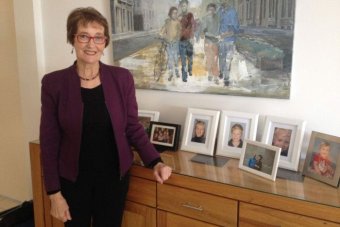Queenslander Christine Bryden has spearheaded lobbying efforts for people with dementia for almost two decades, but she is preparing to take a step back from public life to fight her own battle.
Ms Bryden’s advocacy has taken her all across Australia and to Japan, fighting for the rights and dignity of people with the terminal illness.
All the while, Ms Bryden has been faced with her own diagnosis of dementia.
The one-time biochemist and prime ministerial advisor got the devastating news when she was just 46.
The current neurologist calls me … remarkable because he hasn’t seen anybody last 20 years and still be talking. To me it’s tragic that our imagery [of dementia] is of the elderly, so that people who are younger don’t get the sorts of support that they need.
Christine Bryden
“Forty-six years old, just been divorced, and I just didn’t expect a diagnosis of dementia,” she said.
“Worst couple of years of my life.”
The doctor’s prognosis was grim.
“He said ‘oh, in about five years you’ll be demented, in three years in a nursing home, and then you’ll die’,” she said.
But that was 20 years ago.
Ms Bryden’s brain function is diminishing, but unusually slowly.
She continues to defy and mystify the doctors.
Christine Bryden’s 5 tips pre- and post-dementia diagnosis:
- Maintain a healthy diet
- Look after your heart
- Mentally challenge your brain – try new things
- Stay physically fit
- Keep socialising
“The current neurologist calls me – what does he say – ‘remarkable’ – because he hasn’t seen anybody last 20 years and still be talking,” she said.
It has allowed Ms Bryden to write books, address conferences and make media appearances around the world, giving a first-hand account of what it is like to have dementia, while pushing for better support and services, particularly for people with early onset dementia.
“To me it’s tragic that our imagery is of the elderly, so that people who are younger don’t get the sorts of support that they need,” she said.
‘Second leading cause of death in Australia’
Alzheimer’s Australia said 25,100 Australians had early onset dementia, defined as affecting people under the age of 65, including people as young as 30.
In total, there are more than 342,000 Australians living with dementia at the moment.
Without a medical breakthrough, that figure is forecast to rise to 900,000 by 2050.
Victoria Beedle, Queensland chief executive of Alzheimer’s Australia, said that was huge.
“It’s now become the second leading cause of death in Australia,” Ms Beedle said.
Ms Bryden will speak at a Global Action Against Dementia event in Brisbane on September 2, during Dementia Awareness Month, but the disease is starting to take its toll.
“I can wake up in the morning and I don’t know what day it is. I don’t know what I’m going to do. I get anxious,” Ms Bryden said.
“Most of the day I struggle with words – I can’t think of times when it’s easy.
“It’s not only frustrating, but it’s actually soul destroying because that was very much part of who I was – someone who was good with words and thinking.
“I used to be able to think about complex things.”
‘There’s sort of less of me to keep going’
But Ms Bryden keeps physically active, socially engaged and challenges herself to learn new things.
“I do things like painting every now and then,” she said.
“Try to learn Twitter, Facebook, LinkedIn – trying to understand what they all mean.”
While Ms Bryden wants to keep advocating, she said she was trying to do less.
“I don’t want to overstretch myself,” she said.
“I feel like I’ve got my legacy out there – talks, books – it’s all out there on the public record.
“I don’t want to burn myself up any more, because I feel there’s sort of less of me to keep going.
“It’s trying to think about each day as precious – each day to enjoy the day.”
People seeking further information about the illness can phone the national dementia helpline on 1800 100 500.


